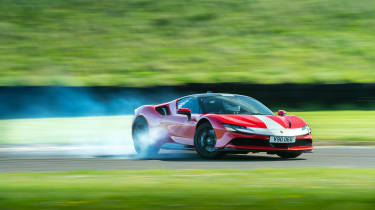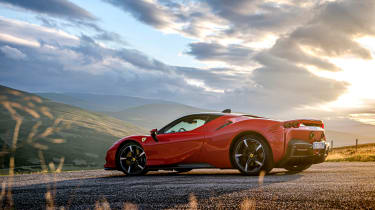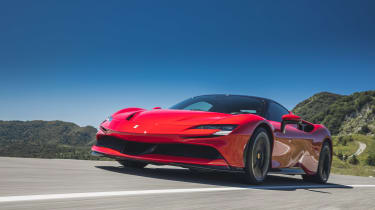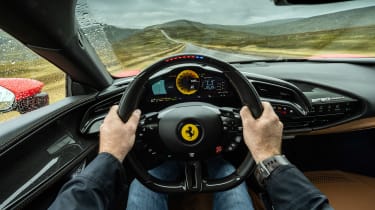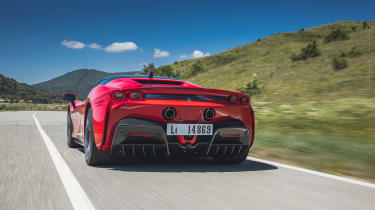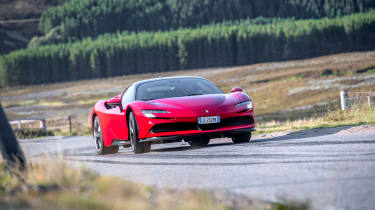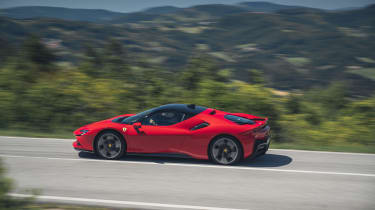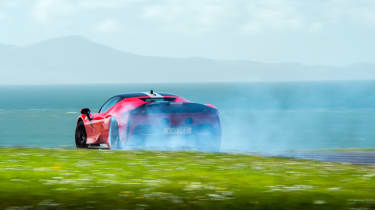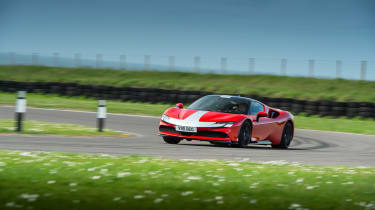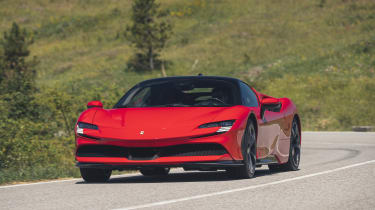Ferrari SF90 Stradale (2019 – 2024) review – Maranello’s flawed 986bhp hyper hybrid
Ferrari’s first production hybrid supercar was an ballistically quick device, if at times a difficult one to engage with
Such was its potency and advanced technology, it was hard to believe the SF90 Stradale was a series production car. It was a testament to Ferrari’s commercial acumen and engineering advantage that this flagship stole such a march on its rivals. With its introduction, the supercar arms race entered a blistering new phase, in which a showroom-spec supercar boasted hypercar performance. Now, five years on, we’re in a world of Lamborghini Revueltos and Aston Martin Valhallas – productionised hyper hybrids late to the party the SF90 started.
The SF90 didn’t arise by chance, of course. Rather it played the role of figurehead ahead of the wider application of hybrid tech into other new Ferraris, like the 296 GTB. But as we found in our 2021 evo Car of the Year, turning all of its considerable technology into an engaging driving experience was a challenge that even the prancing horse struggled to execute.
Engine, transmission and technical highlights
The SF90’s twin-turbocharged V8 petrol engine was bored to increase capacity to four litres. It was also mounted significantly lower, too, thanks to radically altered intake and exhaust systems and a smaller flywheel. A narrower cylinder head design featured a new high-pressure direct injection system which improved combustion and efficiency, while the turbos employed electronically controlled wastegates to improve emissions.
More reviews
The SF90 also got a new eight-speed evolution of the F1 dual-clutch transmission. Designed without a reverse gear, it was 10kg lighter than the F8 Tributo’s seven-speed ’box, with 100ms shifts that were 30 per cent faster than those of the 488 Pista.
In addition to its V8 petrol engine, Ferrari’s first plug-in hybrid featured three electric motors powered by an 8kWh lithium-ion battery. Producing a peak of 217bhp, this brought the SF90’s combined power output to 987bhp. With one motor driving each front wheel and a third motor sandwiched between the V8 and the transmission driving the rear axle, the SF90 divided drive according to powertrain setting.
In eDrive mode SF90s are propelled by the front wheels only. In Hybrid mode the electrically driven front axle works in conjunction with the petrol-electric rear axle. Then, above 135mph the front axle decouples, with all the battery power sent to the third motor, powering the rear axle only.
To blend, balance and control the combined effect of the conventional Brembo carbon disc brakes and the regenerative braking effect from the electric motors, Ferrari developed a brake-by-wire system.
As you’d expect, a car named after the illustrious Scuderia Ferrari F1 team featured extensive aerodynamics, the SF90’s smooth shape punctuated by numerous intakes, vents and heavily sculpted surfaces, which channel cooling air to where it's needed, extracting hot air from where it’s not and guiding the rest over and beneath the car to minimise drag and maximise downforce.
A highlight was the so-called ‘Shut-off Gurney’, an active aerodynamic surface that opens and closes automatically in order to generate maximum downforce when required. Even the wheels were designed with aerodynamics in mind, the rims featuring wing profiles between the spokes that act as rotors, generating additional downforce by sucking more air across the front diffusers and extracting air from the wheelarches.
The SF90’s chassis was largely constructed from aluminium, with certain key areas – such as the rear bulkhead – employing carbonfibre to add strength and reduce weight. Hollow castings were also developed, again to save weight, with new alloys used to increase stiffness and improve NVH. The gains were considerable: 20 per cent improvement in bending stiffness and 40 per cent higher torsional rigidity.
The Assetto Fiorano pack added some serious hardware on top of the SF90’s already out-of-this-world technical appointment. Underneath, you got multimatic dampers that were not electronically actuated for improved responses and a titanium exhaust.
To spot an SF90 so-equipped, you look out for the extended carbon lip at the rear, carbon wheels, carbon splitter elements, carbon door cards and sometimes, a distinctive livery. More downforce (390kg) and less weight (-30kg) are welcome.
> Ferrari F8 Tributo (2019 – 2023) review – the last pure petrol mid-engined Ferrari
Inside all SF90s, a 16-inch curved-screen display dominated the instrument binnacle and formed the centrepiece of what was at the time Ferrari’s all-new, all-digital HMI, or Human-Machine Interface, controlled entirely from the steering wheel. It featured a small – and, we have to say, somewhat tricky – control pad on the right-hand spoke for navigating the various infotainment menus. There were also two manettinos – one for the SF90’s dynamic modes, another to select powertrain modes.
Performance and 0-62 time
As you might expect, the SF90‘s acceleration was exceptional when new and still is: 0-62mph takes just 2.5sec, 0-124mph just 6.7sec. Top speed is 211mph and it will lap Fiorano in 79 seconds.
In terms of readily accessible point-to-point pace, the SF90 was a whole new level of excess. Such is the fidelity of its dynamic systems, the immediacy and quantity of power and torque on-tap, not to mention the levels of grip, traction and braking, the SF90 allows drivers of even moderate skill the opportunity to enjoy the full force of almost 1000bhp.
In the more senior of its dynamic modes – that’s to say CT Off and ESC Off – it requires considerably more in the way of skill and self-control. Yet still it summons such devastating speed you can only extend it for a few handfuls of seconds before you’re travelling at velocities that would almost certainly result in your incarceration.
While it’s a magnificent achievement making this much performance so exploitable, it sees the SF90 continue along the automotive industry’s questionable arc. One that places an emphasis on power and speed, despite the wider world finding fast cars less and less palatable.
Ride and handling
This said, if you can accept you will only rarely dip into the upper reaches of its performance, then there’s still much to admire about the SF90. It steers with surgical precision and handles incredibly well. While notoriously difficult to perfect, Ferrari has got closer than anyone to doing so. Only at low speed is there a significant disparity between pedal pressure and braking response. At higher speeds, including flat-out on track, the braking system is exceptional.
The driver aids are so finely tuned that you can lean on them with absolute trust, or, if you have the skill and confidence, feel the machine move around beneath you. Despite the Stradale name, it also shines on track. Given it weighs 1570kg dry (with lightweight options) – which equates to a real-world kerb weight of close to 1700kg – that’s quite some achievement.
> Ferrari 812 Superfast (2017 - 2024) review – a V12 GT with hypercar intensity
The hybrid tech boosts the SF90‘s performance and green credentials, but the electric motors, battery and associated cabling etc., weigh 270kg. So, despite plenty of weight savings elsewhere in the car, the SF90 is 240kg heavier than the F8 Tributo.
Impressive though it is to have a near-1000bhp supercar that can also drive in near silence on battery power alone, that’s a hefty penalty to pay. Especially when it ultimately leaves you with a huge surplus of unuseable performance on the road.
Inevitably, you’re left to wonder what an SF90 would be like shorn of its hybrid hardware and powered instead by an evolution of the Ferrari's naturally aspirated 789bhp V12. Yes, this is missing the point somewhat – especially as it would still be too fast! – but there’s little doubt such a car would offer a more visceral and emotionally charged driving experience.
As it stands, the SF90 Stradale is an extraordinary driving machine, but one which leaves you questioning whether the application of such mind-blowing technology is taking us further from where we really want to be.
Ferrari SF90 Assetto Fiorano – evo Leaderboard
‘The accident you could have pushing it in the SF90 could be massive and go on for a very long time indeed, if you went off in the wrong place at Anglesey. Correction, if you went off anywhere at Anglesey. And by ‘pushing it’ I don’t just mean opening it up a bit down the straights and seeing what it can do in the corners, then timing it over a couple of laps against the stopwatch. I mean leaning on it hard enough to get a lap time that the eight-strong brigade of Ferrari engineers and PR people who are here today will be happy with. Given that they’ve turned up with a truck that contains three different types of tyres – including grenade-spec Cup 2 Rs that are good for two laps, and two laps only, they say – it’s obvious they aren’t here to muck about.
‘More worrying still, they’ve got a simulation time for the SF90 around the Coastal Circuit that’s been established back at the factory on a computer. So they know precisely how fast it should go, assuming the conditions are perfect. And guess what, just for once at Anglesey, they are. The sun is out, the sky is blue, there’s not a cloud to spoil the view and… it’s not so much raining in my heart as pounding with a heady mix of anxiety and adrenaline-fuelled excitement as I climb aboard for my first timed run.
> Ferrari Enzo (2002 - 2004) – review, history and specs of an iconic hypercar
‘It takes patience and plenty of laps to suss which engine and chassis modes to use for a fast lap. Not for the juice setting, because you want as much as possible at all times, but rather for the ESP and TC systems. The engineers say to use Qualify mode for the motor and CT-off for the chassis, which means full beans and no traction control but still a small amount of stability control. I’m fairly sure that switching the whole lot off and hanging on tight would be faster, eventually, maybe. But it’s so damn easy to light the rear tyres up in any of the first five gears, it’s actually quite nice to have a small bit of safety net to fall back upon. Even one that has quite big holes in it.
‘Whatever the quickest mode may be (I go for the factory recommendation in the end) one thing becomes clear during my exploratory laps in the SF90. This is not the same car we drove in Scotland for eCoty 2021, in which the Ferrari finished flat last. It feels like a completely different car. Why? Because unlike the one we drove in Scotland, this one has the optional Assetto Fiorano pack fitted which, amongst other things, brings very different Multimatic dampers that aren’t electronically actuated and make the whole car feel far more natural in its responses. It’s also slightly lighter and has more downforce than the eCoty car, plus it’s not raining at Anglesey, when it did some of the time in Scotland.
‘Anyway, back in the pitlane with the ‘correct’ SF90, and with all the other stuff mostly worked out in my head, I climb back in, heart thumping, eyes on stalks, belts done up tighter than an evo editorial budget, with a shiny new set of Cup 2 Rs fitted. To get these up to the right temperature and pressures, the Ferrari techs ask me to do two slow laps with no aggressive inputs, then to come back in. The SF feels lovely even on the warm-up laps. Back in the pits, they then check and drop the pressures a touch, then the main man gives me a thumbs up and says the magic words with a great big smile across his chops. ‘Time to push,’ he says. ‘And to enjoy!’
‘Even on the out lap the SF90 feels different, with a snap to its steering response that simply wasn’t there on the regular Cup 2s. It also has more grip, everywhere, and more bite from its brakes. The whole car feels primed and ignited in a way that it hasn’t quite up to this point. And on the flying laps it feels absolutely incredible, at which point everything about the SF90 crystallises and makes perfect sense. Its purpose – to simply cover ground as fast and as efficiently as possible – becomes blindingly clear. And I have to admit, I fall in love with it completely at this moment.
‘There isn’t a huge amount of feel on offer from any of its controls in a traditional sense. The steering is super-light and super-precise, allowing me to put the nose pretty much exactly where I want in any corner. But the joy comes purely from the speed it can carry into and through the turn, and from the severity with which it stops for those corners. Whatever ‘feel’ there is, it’s negligible, but to be honest it doesn’t really matter.
‘It also generates much more traction and much more grip on the 2 Rs, to a point where I can use one gear higher than I have previously in at least three corners. The brakes also feel immense on these tyres, while the speed and precision of the gearbox allow you to shift gears in a way, and in places, that would be outright impossible with a manual, or even with most other dual-clutch autos.
‘But it’s through the terrifying ‘is it or isn’t it flat’ kink on the back straight that the SF90 feels most incredible of all with the 2 Rs fitted. And where the inertia it supposedly has just seems to evaporate. Instead, it just hunkers down and feels glued enough to give me the confidence to keep the throttle wide open in sixth, whereas previously I’d been short-shifting to seventh because it felt too wild, and too damn scary, to keep it nailed in the lower gear.
‘According to the car’s on-board data-logger, it hit 247kph at this point before braking for the left-hander at the top of the hill. That’s 153.4mph. No other car I’ve driven round Anglesey has ever hit 150mph through here as far as I recall. That’s how efficient the SF90 is at covering ground.
‘In the end, after a couple more runs in which it went a touch quicker still, it did a 1:09.99 lap. And although I almost felt like a bit of a passenger for much of that lap, watching the game unfold in the windscreen, it felt pretty out of this world at the same time. I climbed out oscillating just a touch afterwards, I don’t mind admitting. It also beat Ferrari’s sim lap by a whisker and set a new production car lap record (at the time) in the process.’ – Steve Sutcliffe, evo 299, July 2022.
Ferrari SF90 values, rivals and successor
Unless you’re prepared to compare apples to oranges, the SF90 Stradale had no direct or obvious rivals when new. At £375,000 it was significantly more expensive than almost any other series production supercar, save perhaps for the comparatively caveman-ish Lamborghini Aventador Ultimae. Yet it boasted the power and performance of £1m+ hypercars such as the LaFerrari, McLaren P1 or Porsche 918 Spyder. That its technology and sophistication made these once cutting-edge and strictly limited-edition machines look outmoded speaks volumes for the pace of development, not to mention Ferrari’s commitment to building the world’s most advanced series production supercars.
Its 2019 reveal feels like some time ago, when you consider that what could be described as rivals in a technical sense only materialised a good half-decade on, just as the SF90 left showrooms. The Lamborghini Revuelto and Aston Martin Valhalla both mix electric and petrol power to c1000bhp effect like the Ferrari, though both have a carbonfibre tub and the Lamborghini has the benefit of a nice big emotive V12 behind your ears, rather than a slightly muted twin-turbo V8.
What are SF90 values like now? Well, being a series production car rather than a limited special, or halo hypercar, they have depreciated, if only a little. Prices start (at the time of writing, April 2025) just north of £280k, for an Assetto Fiorano car with just over 12,000 miles. SF90 values were a hot-button issue, given how novel its hybridity is in this arena and to this brand. Some do fear its complexity and the shelf-life of some of the components, namely the batteries. All the same, the SF90 really is all but a hypercar, for supercar money.
As for a successor? Well, the F80 hypercar is here, albeit as an uber-flagship in the tyre tracks of LaFerrari, Enzo and F50, rather than SF90. But among the mysterious prototypes often spotted around Maranello, there are some conspicuously SF90-shaped mules that some speculate are a successor. Sooner or later, we’ll know for sure.
Ferrari SF90 specs
| Engine | V8, 3990cc, twin-turbo, plus three electric motors |
|---|---|
| Power | 986bhp (combined) @ 7500rpm |
| Torque | 590lb-ft (engine only) |
| Weight (dry) | 1742kg (1570kg) |
| 0-62mph | 2.5sec |
| Top speed | 211mph |
| Price (new) | £376,048 |
| Price now | From £280k |
